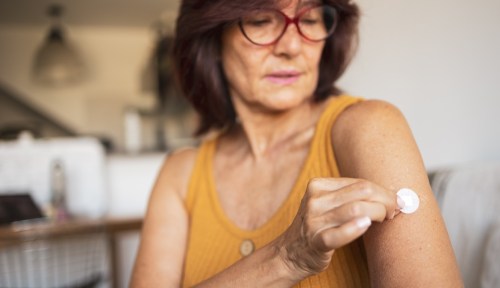Thanks in part to the period positivity movement, it’s normal (and welcome!) for people to talk about their menstrual health like experts. But unfortunately, the same can’t be said for menopause and perimenopause. At age 49, I have certainly experienced my fair share of perimenopausal symptoms. But it was only until recently that I learned about perimenopausal depression—a condition that sits in nearly as much silence as perimenopause itself.
Perimenopausal depression (PD) is essentially depression that manifests during the transition into menopause. It’s not experienced by everyone who goes through menopause, but like clinical depression, the symptoms can be debilitating. Think: increased fatigue, slowed cognition, inattentiveness, mood swings, feeling worthless, unexplained crying, sleep issues, irritability and anxiety.
It’s also a bit different from other female-centric forms of depression like premenstrual dysphoric disorder (PMDD) and postpartum depression. “While PMDD has a more anxious and at times labile presentation, and postpartum depression may have troubling intrusive thoughts about the infant and the mother’s safety, PD appears in the basic forms of depression,” says Michael Tahery, an OB/GYN and urogynecologist. “The one characteristic I have noticed and is not spelled out in official descriptions is PD may have a more gradual and insidious onset. This leaves the patient in the early stages wondering why they are snappy, unmotivated, tired, not sleeping normally or other things characteristic of depression but not as characteristic of the individual.”
“My depression reached the point where I was having two reasonable days a month…I didn’t think my marriage was going to make it.” —Alle C. Hall, writer and mom
This was certainly true for Alle C. Hall, a writer and mom from Seattle. “With perimenopause, my depression reached the point where I was having two reasonable days a month, the two after my period ended,” she recalls. “For the rest of the month, I threw things. I screamed at my husband, even at my children, whom I had yelled at maybe three times in their six and nine years on the planet. I didn’t think my marriage was going to make it.”
“Perimenopausal depression can have several stressors or triggers that are unique to the midlife stage a woman is going through,” says Neelima Kunam, MD, a board-certified adult psychiatrist, like caring for elderly parents and younger children simultaneously, career stresses and changes, or the loss of loved ones. The shift in hormone levels during perimenopause, when estrogen production slowly starts to decline, can also play a role—but it’s not a cause-and-effect relationship. “[Hormones causing depression] has been a misunderstanding for decades and has kept women from the basic treatments that are effective,” Dr. Tahery says. “Hormones are only triggers in women who are prone to depression. This latter point is important to dispute the other common misconception, which is that women’s hormonal changes make them inherently too emotional or irrational.”
Perimenopausal depression can go undiagnosed or untreated because people are simply unaware it is a diagnosis. They may simply assume they are tired, over-stressed or dismissed as overreacting. It may also be the first time they are experiencing depressive symptoms, says Dr. Tahery. “These patients usually do not have a history of depression so this is their first experience and they will not be aware of what is happening.”
It doesn’t help that doctors haven’t always had the framework and knowledge to properly help patients suffering from PD; the first-ever guidelines for evaluating and treating the condition were just released in September 2018. This has led to improper diagnoses in the past. “Some [people] undergo testing for fatigue—thyroid, anemia, etc—and are told they are fine and to get more rest. A few simple questions here would reveal the diagnosis,” says Dr. Tahery. “It’s important for clinicians and women to be aware of the overlap of menopausal symptoms and the symptoms of depression,” adds Dr. Kunam. “There can be a masking of depression by what may seem to be expected physical symptoms of menopause.”
Here’s what it’s like to get a fertility test:
As with any mental health issue, experts say that someone experiencing PD should work with their doctor to come up with a treatment plan that’s appropriate for their needs. But in general, treatment is similar to that for other forms of depression, including cognitive behavioral therapy or antidepressants, says Craig Salido, MD, an OB/GYN at Mission Hospital & Mission Heritage Medical Group. Lifestyle changes can also be important during this time, he adds, like keeping up a good exercise routine, prioritizing sleep hygiene, and meditation. “Avoiding excessive alcohol during this time is also recommended, as alcohol itself is a depressant,” he adds.
One thing not on that list: hormonal solutions. “Hormone treatment is up to the patient and her primary care doctor or OB/GYN, but is not a treatment for PD,” adds Dr. Tahery. Indeed, while some research outlined in the PD guidelines found that while estrogen supplementation can help some antidepressants work better for perimenopausal patients, there is mixed clinical evidence that hormone therapy on its own can help with perimenopausal depression.
Hall ultimately decided to get a hysterectomy under the advisement of her doctor for her PD. “I felt ‘back to myself” the morning after the surgery,” Hall says. “It’s been more than three years and I have never had a day of regret.” (It should be noted that a hysterectomy or oophorectomy is not currently one of the recommended treatments for PD.)
Perimenopausal depression is daunting and certainly tricky to navigate. But with more awareness and research, hopefully knowledge of it will help people get the help that they need sooner.
This new startup wants to provide OTC solutions for menopausal women. And here’s the latest on the most innovative science looking to treat menopause symptoms.
Sign Up for Our Daily Newsletter
Get all the latest in wellness, trends, food, fitness, beauty, and more delivered right to your inbox.
Got it, you've been added to our email list.











